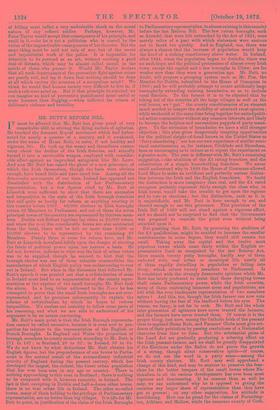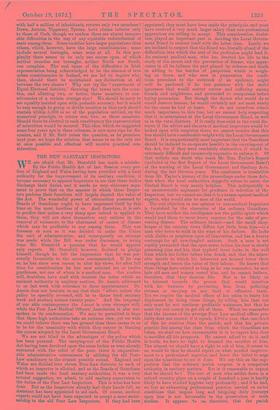MR. BUTT'S REFORM BILL.
1 T must be allowed that Mr. Butt has given proof of very remarkable skill in stirring the dying embers of agitation. He touched the dormant Repeal movement which had hyber- nated for nearly a quarter of a century, and it awakened, under the name of Home Rule, to noisy, if not healthy and vigorous, life. He took up the weary and threadbare contro- versy about the decline of the Irish fisheries, and actually turned it into a serviceable weapon, employed with consider- able effect against an imprudent antagonist like Mr. Lowe.
And now Mr. Butt has raised the ghost of a new grievance, of which the Irish themselves, though the facts were obvious enough, have heard little and have cared less. Among all the democratic movements of our time, Ireland has appeared not dissatisfied with the distribution of her Parliamentary representation, but a few figures cited by Mr. Butt at Limerick were sufficient to show that there are anomalies and inequalities in the state of the Irish borough franchise that call quite as loudly for reform as anything existing in this country before 1867. 48,000 electors in Irish boroughs return 39 Members to Parliament, and out of these the seven principal towns of the country are represented by thirteen mem- bers. Dublin and Belfast together lay claim to 26,000 voters, and when the next five considerable towns are also subtracted from the total, there will be left no more than 9,000 or 10,000 electors to be represented by the remaining 26 Members. Plainly there is room for reform here, and Mr. Butt at Limerick moralised loftily upon the danger of erecting the fabric of political power upon too narrow a basis. He did not, however, indicate in what way the lack of urban voters was to be supplied, though he seemed to hint that the borough elector was one of those valuable commodities the manufacture of which English policy was endeavouring to root out in Ireland. But when in the discussion that followed Mr. Butt's speech it was pointed out that a redistribution of seats in Ireland must lead to an augmentation of the county repre- sentation at the expense of the small boroughs, Mr. Butt took the alarm. In a long letter addressed to the Times he has attempted to prove that the small Irish boroughs are not over- represented, and he promises subsequently to explain the scheme of redistribution by which he hopes to redress inequalities. We confess our inability to follow some parts of his reasoning, and what we are able to understand of his argument is by no means convincing.
Mr. Butt's main point is that the Irish Borough representa- tion cannot be called excessive, because it is even now in pro- portion far inferior to the representation of the English or Scotch Boroughs. In England and Wales the proportion of borough members to county members, according to Mr. Batt, is 271 to 187; in Scotland, 26 to 32; in Ireland, 39 to 64. We do not know by what deductions Mr. Butt obtains his English figures, but the preponderance of our towns in Parlia- ment is the natural result of the extraordinary industrial activity of England during the present century, which has developed the largest, the richest, the freest urban population that has ever been seen in any age or country. There is nothing approaching to this even in Scotland ; there is nothing to be compared with it, however remotely, in Ireland. The fact is that, excepting in Dublin and hall-a-dozen other towns, there is no true urban life in Ireland. The other so-called towns, many of them holding to the privilege of Parliamentary representation, are no better than big villages. It is idle for Mr. Butt to point, in justification of the claim of the Irish Boroughs to Parliamentary representation, to abases existing in this country before the last Reform Bill. The few rotten boroughs, such as Arundel, that were left untouched by the Act of 1831, were merely relics of a past with which statesmen were anxious not to break too quickly. And in England, too, there was always a chance that the increase of population would keep the head of a sinking constituency above water. In Ireland, after 1841, when the population began to dwindle, there was no such hope, and the political pretensions of almost every Irish town, except the capital and a few boroughs in Ulster, are far weaker now than they were a generation ago. Mr. Butt, no doubt, will propose a grouping system such as Mr. Pim, the Member for Dublin, submitted to the House of Commons in 1868; and he will probably attempt to create artificially large boroughs by extending existing boundaries, so as to include rural districts. To the former it is to be objected that by taking out of the counties all the large villages as well as the real towns, we " gat " the county constituencies of an element much needed to temper the stolidity of unmixed rural opinion ; while we should at the same time bring together for united politi- cal action communities without any common interests, and likely to become the helpless and unconscious puppets of party mana- gers. To the extension of boundaries we have a still stronger objection ; this plan gives dangerously tempting opportunities for the political sleight-of-hand known in the United States as "Jerry-mandering ;" nor has our own experience of similar semi- rural constituencies, as, for instance, Cricklade and Shoreham, been so encouraging as to induce us to repeat the experiment on a greater scale. The ease is different with Mr. Butt's remaining suggestion,—the abolition of the Li rating franchise, and the substitution of a simple householding franchise. We never could understand why in 1868 the House of Commons allowed Lord Mayo to make an invidious and perfectly useless distinc- tion between the Irish and the English franchises. No doubt the distinction is more imaginary than real, and the £4 rated occupiers probably represent fairly enough the class who, in Irish towns, would take the trouble to get upon the register and to vote at elections ; but the distinction, such as it is, is unjustifiable, and Mr. Butt is keen enough to see, and shrewd enough to use this grievance. This provision of the Irish Bill of 1868 will not stand against a vigorous effort, and we should not be surprised to find that the Government was prepared to concede the point even without being attacked upon it.
But granting that Mr. Batt, by procuring the abolition of the £4 qualification, might be enabled to increase the smaller constituencies in some degree, they would still remain too small. Taking away the capital and the twelve most populous towns which come fairly within the English re- presentative limit as recognised by the last Reform Act, there remain twenty petty, boroughs, hardly any of them endowed with real urban or municipal life, nearly all of them rapidly dwindling in population or falling into
decay, which return twenty members to Parliament. Is it consistent with the strongly democratic opinions which Mr.
Butt has lately professed to insist that these decaying towns shall retain Parliamentary power, while the Irish counties, many of them embracing immense areas and populations, are left with the very inadequate representation of two members apiece And this, too, though the Irish farmer can now vote without having the fear of the landlord before his eyes. The reason, we fancy, is not far to seek. Mr. Butt and the whole later generation of agitators have never trusted the farmers, and the farmers have never trusted them. Of course it is the proper thing, just now, among the Catholic Irish of the peasant class to applaud Home Rule, and Farmers' Clubs must give evi- dence of their patriotism by passing resolutions of a Nationalist character from time to time. But the substantial gains of the Land Act are gradually producing a sobering effect on the Irish peasant-farmer, and we shall be greatly disappointed if the Elections under the Ballot do not prove the growth of a strong, though silent conservative spirit—of course, we do not use the word in a party sense—among the Irish county electors. Mr. Butt may well apprehend a change of this kind, and may be anxious to preserve the fran- chise for the hotter tempers of the small towns where Na- tionalism in all its various developments has ever been most vigorous and domineering. If he reasons thus, as well he may, we can understand why he is opposed to giving the counties any larger share of representation than they have got at present ; on any other supposition, his attitude is bewildering. How can he plead for the claims of Portarling- ton, Athlone, and Mallow, while the immense county of Cork, with half a million of inhabitants, returns only two members ? Down, Antrim, Tipperary, Tyrone, have claims inferior only to those of Cork, though we confess there are almost insuper- able difficulties in the way of any equitable redistribution of seats among them. Some counties have larger populations than others, which, however, have the large constituencies ; some include several boroughs, some none at all. In this per- plexity there seems to be only one course open, of which neither counties nor boroughs, neither North nor South, can complain. The real cause of the difficulties in Irish representation being acknowledged to be the absence of true urban constituencies in Ireland, we are led to inquire why, then, should there be maintained any distinction at all between the two classes ? Why not try the "experiment of Equal Electoral districts," throwing the towns into the coun- ties, and allotting two, or better, three members to con- stituencies of a certain average size ? We should be sorry to see equality insisted upon with pedantic accuracy, but it would be easy enough to group or divide counties so that each should contain within 5,000 or so of the population entitled, on the numerical principle, to return one, two, or three members. Should three be allotted to each constituency the representation of minorities would be secured. This idea, which we suggested some four years ago in these columns, is now more ripe for dis- cussion, and if Mr. Butt raises the question, as he promises, next year, we hope the solution that seems to us the only one at once possible and effectual will receive practical con- sideration.



































 Previous page
Previous page